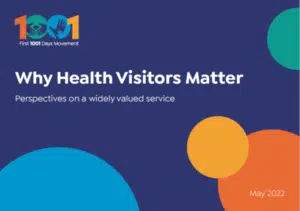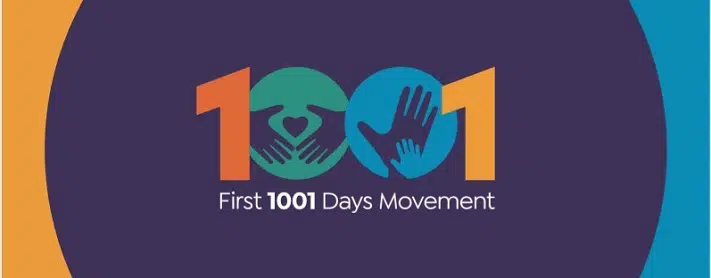 Today, the First 1001 Days Movement has released a new report: “Why Health Visitors Matter: perspectives on a widely valued service”. This report is a compilation of short testimonies about why health visitors are important in ensuring that all babies and children are safe, healthy, and able to thrive. The testimonies showcase the vital role of health visitors, demonstrating the breadth and depth of their work.
Today, the First 1001 Days Movement has released a new report: “Why Health Visitors Matter: perspectives on a widely valued service”. This report is a compilation of short testimonies about why health visitors are important in ensuring that all babies and children are safe, healthy, and able to thrive. The testimonies showcase the vital role of health visitors, demonstrating the breadth and depth of their work.
The First 1001 Days Movement is a campaigning alliance of over 200 organisations who work together to promote the importance of sensitive and nurturing relationships for babies and young children’s emotional wellbeing and optimal development. The iHV is privileged to be a member of the First 1001 Days Movement steering group and we are indebted to all the members of this alliance who have joined together to call on the Government for investment in health visiting. This forms part of the Movement’s wider ambitions to drive change by inspiring, supporting, and challenging national and local decision makers to value and invest in the first 1001 days.
Key messages from the report:
- Health visitors have the potential to do so much for our babies, our families, and our public services.
The first 1001 days is a period of opportunity and vulnerability. Support for our babies, children and families is needed now, more than ever. Health visitors support children’s development and help to keep them safe. They are skilled Specialist Community Public Health Nurses able to engage and build relationships with families, understand their health and care needs, offer support and intervention, and broker engagement with other services.
- Current resourcing decisions mean that many health visitors cannot effectively do the important work they were trained to do.
Since 2015, when responsibility for health visiting was transferred to local authorities, it is estimated that at least 30% of the health visiting workforce has been lost, with further losses forecast. The Public Health Grant has fallen in real terms from £3.99 billion in 2015–16 to £3.3 billion in 2022-23, this is at a time when need has increased.
Currently, the health visiting metrics include phone and virtual appointments as “reviews”; and the latest quarterly data shows that 18.6% of babies missed out on their 9-12-month review and 27.7% of toddlers missed out on their 2-2.5-year-old review. More children are also falling behind with their development, yet fewer are engaging with services such as early education and childcare.
There is wide and unwarranted variation in health visiting support between different local authority areas. Urgent national and local action is needed to ensure that all babies and young children receive services that they need and meet national guidelines.
Alison Morton, Executive Director, iHV said:
“We welcome this report which is published at a critical time in our country’s journey through the pandemic and its wake. It lays bare the problems and far-reaching impacts of years of under-investment in health visiting on babies, young children and their families. The report is also focused on finding solutions – it presents a series of testimonies from those who have first-hand experience of the breadth and depth of the health visiting service and the difference that it can make when sufficiently resourced.
“The report is a call to action – babies can’t wait. Will we be satisfied to accept the picture that is being painted of ‘ghost children’ being let down by ‘ghost services’ that have been stripped bare and left ill equipped to manage the level of unmet need? We have a real opportunity to make a difference before it is too late – we join with members of the movement and call for concerted action from national and local government, united by a shared vision to do better for babies.
“We thank all the report contributors who generously gave their time in sharing their experiences and testimonies to bring to life the real and solid difference that health visiting can make for babies, children, families, and our future society.”
The report has 4 policy calls:
- Local authorities must commission and fund health visiting services that are able to offer a high-quality service to all those who need them in line with the Healthy Child Programme.
- The UK Government must properly resource local authorities to enable them to provide health visiting services at al level that delivers everything that government and NICE guidance expects of them, and that families need.
- The UK Government must do more to encourage local authorities to invest in health visiting services and to hold them to account when services are not meeting national guidelines.
- The UK Government must also address shortages in the health visiting workforce: it is time for a demand-driven, well-resourced national workforce strategy and plan.
How can you help?
The First 1001 Days Movement needs your help to make the case for better services for our babies, children, and their families.
You can help by:
- Sharing the report, and your perspectives on why health visitors matter, with local decision makers and politicians, with your networks, and on social media. You can use the hashtag #HealthVisitorsMatter, share the link to the report and tag: @first1001days @sajidjavid and @iHealthVisiting
- Writing to your MP and asking them to attend the NSPCC’s parliamentary event on 16 May (details here)
- Writing to the Health Secretary, Sajid Javid, about their concerns.




